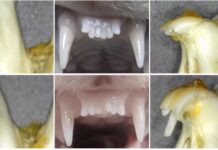ANN/THE STAR – Have you ever heard your child grinding their teeth while they sleep? Or have you seen your child suddenly clenching and grinding their teeth while watching TV?
The above conditions are known as bruxism.
Bruxism is a condition where there is repetitive masticatory muscle activity that is characterised by clenching, tooth-grinding and/or bracing.
The masticatory muscles are those used for chewing food.
It can be categorised into two: sleep bruxism and awake bruxism.
Sleep bruxism is reported to be more common in children, compared to adults, with the frequency ranging from 13 to 49 per cent.
Bruxism in children can have various causes and can result in a range of effects on a child’s oral health.
There is currently no clear understanding on what causes bruxism in children.
Based on its cause, bruxism can be classified as primary (where there is no clear associated disease) and secondary (where the condition is associated with a specific disease or cause).

Some factors that may contribute to the condition include:
– Stress
– Children can experience anxiety just like adults.
– Children who experience stress, for example, from a lot of schoolwork, during exam season or from an upsetting experience, are likely to grind their teeth.
– Teeth misalignment
– Sleep disorders
– Most parents report that their child usually grinds their teeth at night, which may disturb their sleep.
– Medications.
According to the World Health Organization (WHO), the multiple characteristics of bruxism increase the probability of diseases in a child.
These can include:
– Tooth wear
– Persistent grinding of teeth may lead to tooth wear, which is the irreversible loss of tooth structure.
– If not treated early, this may cause tooth sensitivity for children.
– Jaw discomfort
– Children often complain of jaw pain, which can interfere with eating and speaking.
– Headaches
– Sleep disturbances
Affected children may have disrupted sleep at night.
This can affect their ability to concentrate in school.
The treatment for bruxism in children depends on the underlying cause and severity of the condition.
Dentists may recommend one or more of the following:
– If stress or anxiety is the cause of bruxism, reducing stress through therapy or relaxation techniques may help to improve the condition.
– A mouthguard may be constructed to help protect the child’s teeth from further wear.
– Orthodontic appliances may be recommended to realign the child’s teeth if that is the cause.
Bruxism in children can be a challenging condition to manage, with various causes and effects on a child’s oral health. – Assoc Prof Dr Ahmad Faisal Ismail


















































